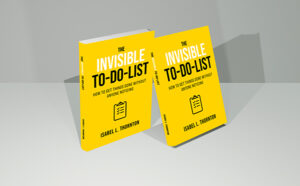
When was the last time you sat still—without a screen, a task, or a soundtrack filling the space? No phone, no scrolling, no background noise. Just… silence?
If that idea makes you squirm, you’re not alone. In today’s hyper-connected world, boredom is treated like a problem to solve, not a space to savor. But in her must-read book, Habit Hacks for Happiness: How to build habits that actually serve you, Tess Alder argues that boredom isn’t a bug—it’s a feature. And it might just be the missing link to your next breakthrough.
The Hidden Cost of Constant Entertainment
You wake up and check your phone. You scroll while you eat. You listen to podcasts while walking, videos while working, and shows while trying to fall asleep. Every quiet moment is quickly filled.
We’ve mistaken stillness for stagnation. But constant input blocks your brain from doing one of its most powerful things: processing.
Tess Alder puts it plainly:
“Every time you reach for a distraction to avoid boredom, you also miss an opportunity to connect deeper with yourself.”
What Boredom Actually Does for Your Brain
While it feels empty, boredom is actually a fertile ground for:
- Memory consolidation: Your brain organizes and integrates what you’ve learned.
- Creative insight: Your mind starts connecting dots in the background, forming new ideas.
- Emotional processing: You can notice feelings that were suppressed during constant stimulation.
- Problem-solving: The wandering mind often lands on solutions when given space.
Studies show that people who allow themselves time to daydream often outperform others in creative tasks. Your best ideas—the ones that feel like sudden “aha” moments—don’t usually come when you’re hustling. They show up when you’re staring out a window or standing in line.
Why Screens Feel Safer Than Stillness
It’s no accident that most of us compulsively grab our phones the second we feel idle. Modern technology is designed to capitalize on discomfort. Boredom becomes the trigger, and a dopamine hit becomes the reward.
But the real danger is what we miss when we never face the blank space. According to Alder, “You can’t grow self-awareness if you never hear yourself think.”
In other words, every time you numb a quiet moment, you lose a chance to reflect, to create, and to reconnect.
The Antidote to Overstimulation Isn’t Less Input—It’s More Stillness
You don’t need to give up all devices or live like a monk to benefit from boredom. What you need is space. Intentional space.
Here are five ways to reclaim your focus and creativity using the power of boredom:
1. Schedule a “No-Input Hour” Each Day
Turn off music, podcasts, TV, and unnecessary notifications for just 60 minutes. You can walk, stretch, clean, or do nothing. Let your brain rest—and watch how it responds.
2. Practice the 30-Second Delay
Before picking up your phone, set a 30-second timer. Ask yourself, “What am I trying not to feel or face right now?” This builds mindfulness and reduces compulsive checking.
3. Embrace the Shower Effect—On Purpose
Ever notice how you have great ideas in the shower? It’s one of the few remaining places without screens. Try replicating that by sitting quietly for 10 minutes with just your thoughts. No pen. No phone. Just be.
4. Let Kids—and Adults—Be Bored
If you’re a parent or leader, resist the urge to fill every gap in your child’s or team’s day. Boredom teaches patience, self-direction, and problem-solving. Over-scheduling kills imagination.
5. Create Boredom Breaks in Your Routine
Use “empty time” intentionally:
- Don’t pull out your phone while waiting in line.
- Take walks without earbuds.
- Sit with your coffee in silence instead of multitasking.
These small habits open the door to clarity and unexpected inspiration.
Why This Matters for Your Mental Health
Avoiding boredom isn’t just an attention issue—it’s a wellness issue. Constant stimulation:
- Trains your brain to expect novelty every few seconds.
- Reduces your ability to focus deeply on important tasks.
- Increases anxiety when left alone with your thoughts.
In contrast, tolerating and even welcoming boredom helps regulate mood, reduce overstimulation, and promote a deeper sense of calm. In Habit Hacks for Happiness, Tess Alder writes:
“Boredom is your mind knocking on the door. What you do next shapes your emotional life.”
Reclaiming Your Time, One Quiet Moment at a Time
We don’t need to quit technology—we just need to stop fearing the spaces in between. Boredom is the birthplace of curiosity. Stillness is where self-trust begins.
So next time you feel the urge to grab your phone, pause. Let the moment be awkward. Let it be empty. Then ask yourself: What would I hear if I finally listened?
Ready to Break the Cycle of Constant Distraction?
Tess Alder’s Habit Hacks for Happiness: How to build habits that actually serve you is filled with science-backed tools and powerful mindset shifts that help you embrace discomfort, resist distraction, and tap into your deepest sources of strength and creativity.
Because sometimes, doing nothing is the most powerful thing you can do.
Author

Alan Saunders is recognized for producing books on Artificial Intelligence and digital wellness, where playful narratives and clear insights are featured. Guidance for concerned parents hoping to safeguard children in an ever-evolving digital world is often emphasized in his writing. Complex AI concepts and practical safety measures are presented in a manner that blends intrigue with accessibility, allowing readers to explore technology’s possibilities while maintaining peace of mind.





